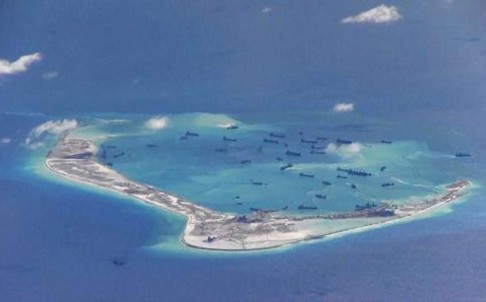China Company Violator of our EEZ and Constitution?
The government should verify if this company was or even now involved in reclamation work in Mischief Reef in violation of the Philippine Constitution that prohibits non Filipino citizens from using and enjoying the marine wealth inside our Exclusive Economic Zone or EEZ. Mischief Reef is part of our EEZ. We should not hire a company that violated our Constitution and our EEZ.
Chinese island-building firm wins contract with South China Sea rival claimant, the Philippines
CCCC Dredging deal finalised during Philippines President Rodrigo Duterte’s visit in Beijing last week, during which he announced ‘separation’ from long-standing ally the US
A Chinese state-owned infrastructure company that helped build artificial islands in a disputed area of the South China Sea has signed a land reclamation deal in the Philippines, a rival claimant in the sovereignty dispute, according to a Chinese newspaper report.
CCCC Dredging, a subsidiary of China Communications Construction Company, would carry out a 208-hectare land reclamation project in the harbour at Davao, where Philippine President Rodrigo Duterte once served as a mayor before assuming the top office in June, Beijing Youth Daily reported this week.
The deal was signed last Thursday during a business dinner that Duterte attended while on a state visit to China, the dredging firm said on its website. The project was expected to be completed by the end of 2019, it said.
Chinese state media hails Duterte’s ‘separation’ from US, but many on social media unconvinced
Another deal sealed during the visit involving a separate CCCC subsidiary – China Road and Bridge Corporation – had also raised eyebrows, according to Philippine media, as the firm has been blacklisted by the World Bank for alleged "collusive practices" relating to a local project.
CCCC Dredging will create land along an 8km stretch of coast in Davao Bay. The site would be used for government offices, businesses, housing, port terminals and industry, the report said.
The project between the Chinese firm and Mega Harbour Port and Development in the Philippines was one of several trade and business deals worth about US$13.5 billion finalised during Duterte’s visit to Beijing last week, when he declared a "separation" from long-standing ally the United States.
Analysts say the move is part of Duterte’s attempt to mend ties with Beijing amid the sovereignty row in the South China Sea and shift his country’s foreign policy away from sole reliance on Washington, dealing a blow to the US’ "pivot to Asia" strategy in the process.
China stepped up its creation of artificial islands in the region last year, alarming several countries in the area, including the Philippines and Vietnam. The work has also drawn criticism from Washington.
Satellite images analysed by IHS Jane’s, the defence consultancy, showed that Tianjin Dredging Company, one of CCCC Dredging’s three subsidiaries, operated most of the giant barges digging sand from the seabed and piling it on remote coral atolls such as Mischief Reef, Subi Reef and Fiery Cross Reef, which are also claimed by the Philippines and Vietnam.
Relations between China and the Philippines have been strained since an international tribunal in The Hague ruled in July there was no legal basis for China’s claims to much of the waters.
The case was brought by the Philippines after China seized a reef over which both countries claim sovereignty.
Duterte’s tilt towards China set to ‘test US pivot to Asia’
The ruling said the artificial islands China had built, including at Mischief Reef, violated the Philippines’ sovereign rights.
China has since rejected the rulings and refused to take part in the proceedings.
Meanwhile, the Philippine Daily Inquirer reported on Wednesday that China Road and Bridge Corporation (CRBC) would be involved in the development of a segment of the Metro Manila Bus Rapid Transit-Edsa project.
The World Bank barred the company for eight years in 2009 after it found the firm had allegedly engaged in "collusion in the bidding process" in a Philippines roads project.
The ban extended to CCCC and its subsidiaries in 2011 after CRBC merged into the new CCCC.

No comments:
Post a Comment